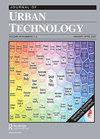将自然作为智慧森林城市的基础设施
IF 4.6
3区 经济学
Q1 URBAN STUDIES
引用次数: 5
摘要
智慧城市通常涉及交通、建筑、能源和通信的数字化。然而,无论是通过监测、自动化、缓解还是增强的过程,城市性质也越来越数字化。本文考虑了通过将自然规划为基础设施而实现的“分裂的城市化”。通过特别关注智能城市森林,我建议智能基础设施的管理逻辑试图将植被及其生态规划和转化为独特的高效和响应的城市有机体。在这个过程中,这些提高效率的项目有可能加剧采掘经济和社会不平等,这些不平等通过“自然网络”放大和具体化。本文章由计算机程序翻译,如有差异,请以英文原文为准。
Programming Nature as Infrastructure in the Smart Forest City
ABSTRACT Smart cities typically involve the digitalization of transport and buildings, energy and communications. Yet urban natures are also becoming increasingly digitalized, whether through processes of monitoring, automation, mitigation, or augmentation. This text considers what “splintering urbanisms” materialize through programming nature as infrastructure. By focusing specifically on smart urban forests, I suggest that the management logics of smart infrastructures attempt to program and transform vegetation and its ecologies into uniquely efficient and responsive urban organisms. In the process, these programs of efficiency have the potential to exacerbate extractive economies and social inequalities that amplify and materialize through the “Internet of nature.”
求助全文
通过发布文献求助,成功后即可免费获取论文全文。
去求助
来源期刊

Journal of Urban Technology
URBAN STUDIES-
CiteScore
8.50
自引率
4.20%
发文量
42
期刊介绍:
The Journal of Urban Technology publishes articles that review and analyze developments in urban technologies as well as articles that study the history and the political, economic, environmental, social, esthetic, and ethical effects of those technologies. The goal of the journal is, through education and discussion, to maximize the positive and minimize the adverse effects of technology on cities. The journal"s mission is to open a conversation between specialists and non-specialists (or among practitioners of different specialities) and is designed for both scholars and a general audience whose businesses, occupations, professions, or studies require that they become aware of the effects of new technologies on urban environments.
 求助内容:
求助内容: 应助结果提醒方式:
应助结果提醒方式:


